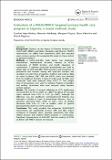Evaluation of A WASH/MNCH Targeted Primary Health Care Program in Uganda; A Mixed Methods Study
View/
Publication Date
2023-02-18Type
Article, Journalviews
downloads
Metadata
Show full item recordCitation
Hajra Mukasa, C., Nankanja, M., Mugisa, M., Valentine, O., & Kagurusi, P. (2023). Evaluation of a WASH/MNCH targeted primary health care program in Uganda; a mixed methods study. Health psychology and behavioral medicine, 11(1), 2185245. https://doi.org/10.1080/21642850.2023.2185245
Abstract/
Background: Evidence on the impact of Maternal Newborn and child health (MNCH) and Water, Sanitation and Hygiene (WASH) interventions on skilled birth attendance (SBA) and neonatal sepsis remains unclear. We conducted this study in Amuru district to generate evidence. Methods: A before-and-after study design was conducted. Interventions implemented included; training of HCWs, construction of WASH facilities, and health education of communities. A digitized structured questionnaire was used to obtain data on ANC and SBA, WASH practices and prevalence of pneumonia and diarrhea among 466 expectant mothers and caretakers of under-fives at baseline, midterm and endline. Data on sepsis incidence, ANC, SBA and WASH status was obtained from six healthcare facilities. A total of 12 KIIs and 12 FGDs were conducted. Data were analyzed using STATA 15. Two sample tests of proportions were used to compare findings at baseline and endline. Qualitative data were analyzed using thematic content analysis. Results: The number of women delivering at HCFs significantly increased from 41.4% to 63.0% (p < .0001). Incidence of neonatal sepsis reduced from 0.6% to 0.2% (p = .0687), although the difference was not significant. Community-level findings also indicated a decline in cases of water-borne illnesses; cases of dysentery decreased from 10.0% to 0.6%, cases of cholera decreased from 8.9% to 1.9% at endline, cases of typhoid decreased from 26.5% to 12.7% at endline. Conclusion: This study revealed that integrated WASH/MNCH interventions can significantly increase ANC and SBA, reduce incidences of neonatal sepsis, diarrhea, pneumonia, and other related diseases and improve WASH practices in communities. Significant improvements in WASH/IPC and the capacity of HCWs to deliver safe MNCH services are realized.
Subject/
Uganda; WASH/MNCH; integrated interventions; neonatal sepsis; skilled birth attendance.
Publisher
PubMedPermalink
https://pubmed.ncbi.nlm.nih.gov/36925760/https://repository.amref.ac.ke/handle/20.500.14173/865
Collections
- General - GEN [367]

